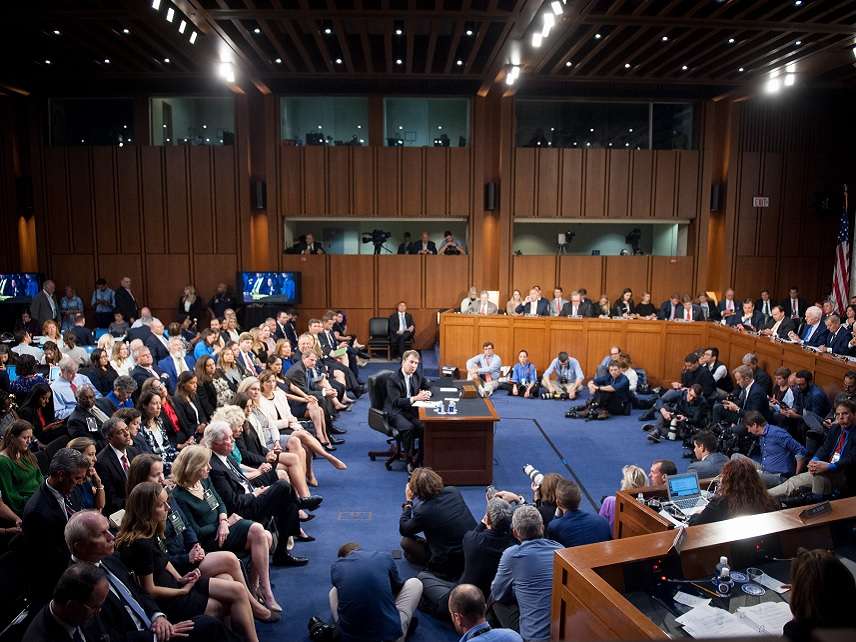'Judge Kavanaugh Was Not Responsible for the Parkland School Shooting'
Parents of school shooting victims lash out over Supreme Court nominee Brett Kavanaugh, but the more troubling responses are from U.S. senators.
The father of a victim in the Parkland school shooting unexpectedly made news at the Supreme Court nomination hearings for Brett Kavanaugh yesterday.
Just walked up to Judge Kavanaugh as morning session ended. Put out my hand to introduce myself as Jaime Guttenberg's dad. He pulled his hand back, turned his back to me and walked away. I guess he did not want to deal with the reality of gun violence.
— Fred Guttenberg (@fred_guttenberg) September 4, 2018
The reasons Kavanaugh didn't shake hands aren't immediately clear, but reading the worst possible motive into it is tendentious to say the least. Guttenberg's tweet predictably sparked angry responses from critics of the Republican Party, Donald Trump, gun rights, and Kavanaugh. Perhaps most notably, it called forth this response from Sen. Kamala Harris (D-Calif.), who has already made clear she intends to vote no on the nominee and who interrupted the opening of the hearings to call for a postponement.
If Kavanaugh won't even give him a handshake, how can we believe he would give gun violence victims a fair shake in court?
— Kamala Harris (@SenKamalaHarris) September 4, 2018
Guttenberg's tweet also called out this response from another parent of a Parkland victim:
Judge Kavanaugh was not responsible for the Parkland school shooting that killed my daughter. @RobertwRuncie, FBI, and Sheriff Israel are.
Judge Kavanaugh is a decent man and should be confirmed.
Stop weaponizing Parkland to advance a dangerous political agenda!
— Andrew Pollack (@AndrewPollackFL) September 4, 2018

I agree with Pollack both that Kavanaugh is in no way responsible for the Parkland shooting and that the mayhem there is best understood as a systematic breakdown among the authorities. (Robert Runcie is the school superintendent of Parkland.) It wasn't just on-the-scene law enforcement and school bureaucrats who failed there either; mental health and child protective services officials also had interactions with Cruz that should have served as warnings. Pollack now heads Americans for Children's Lives and School Safety, a group committed to promoting school safety without increasing gun control restrictions. It's worth noting that even as he (rightly, in my view) says we shouldn't politicize school shootings, it's far from clear what his qualifications are to urge that Kavanaugh be confirmed.
Legal blogger and Reason contributor Ken "Popehat" White is in a better position to make that sort of call. Here's what he wrote after Guttenberg's tweet made the rounds:
If you're enthused about victims of horrific personal tragedies trying to talk to Supreme Court nominees . . . .
. . . will you still be enthused when the issue on that person's mind is not gun control, but "immigrant crime" or "judges coddling criminals"?
— LiterallySlanderHat (@Popehat) September 5, 2018
Will you still be enthused when it's some tormented soul whose loved one was murdered, wanting to lobby the prospective justice to make sure more people on death row get the needle?
Just asking.
— LiterallySlanderHat (@Popehat) September 5, 2018
It's quite possible that Supreme Court nomination hearings, at least since Robert Bork's in the 1980s, bring out the absolute worst in legislators and citizens alike. Despite the intense competition to become a member of the Court, the qualifications for the job are easily met by most candidates who actually get to sit in front of the Senate for confirmation. (Of course, no one is allowed to get that far if he or she is unlikely to win a majority vote.) But the symbolic values that get projected onto prospective justices often have little to do with the individual and more to do with the particular moment the nomination happens to arrive. Pity poor Merrick Garland, who would have been terrible from a libertarian perspective, but clearly got rooked out of a hearing by the GOP majority because his chance came too late in Barack Obama's presidency. Pity libertarian Douglas Ginsburg, too, who was nominated after Bork but forced to withdraw his nomination because he admitted to smoking weed (this was 1987, folks).
According to most of the scholars Reason has talked with, Kavanaugh is, on balance, pretty good if you believe in limited government. Which isn't to say that even someone as rotten as Sen. Dianne Feinstein (D-Calif.), who has a long track record of supporting surveillance, military interventions, and all manners of incursions into basic economic and civil liberties, isn't right when she tweets:
Issues Brett Kavanaugh was involved in as a Republican political operative and in the Bush White House:
Starr investigation
Bush v. Gore
Torture
Warrantless Spying
Rendition of prisonersWe need ALL of Brett Kavanaugh's documents to fully review his record.
— Sen Dianne Feinstein (@SenFeinstein) July 20, 2018
We won't get all of those records, of course, and in many ways I'm more interested in Feinstein's own papers on these topics. The Senate and House, after all, are far more consequential (or should be) in making law and setting policy that the Supreme Court, which is best understood as a validator of social and political change rather than its initiator.
Here's a recent discussion I had with Ken White about Kavanaugh and a ton of other legal issues. Watch below, listen via SoundCloud, or subscribe to the Reason Podcast at iTunes.


Show Comments (79)